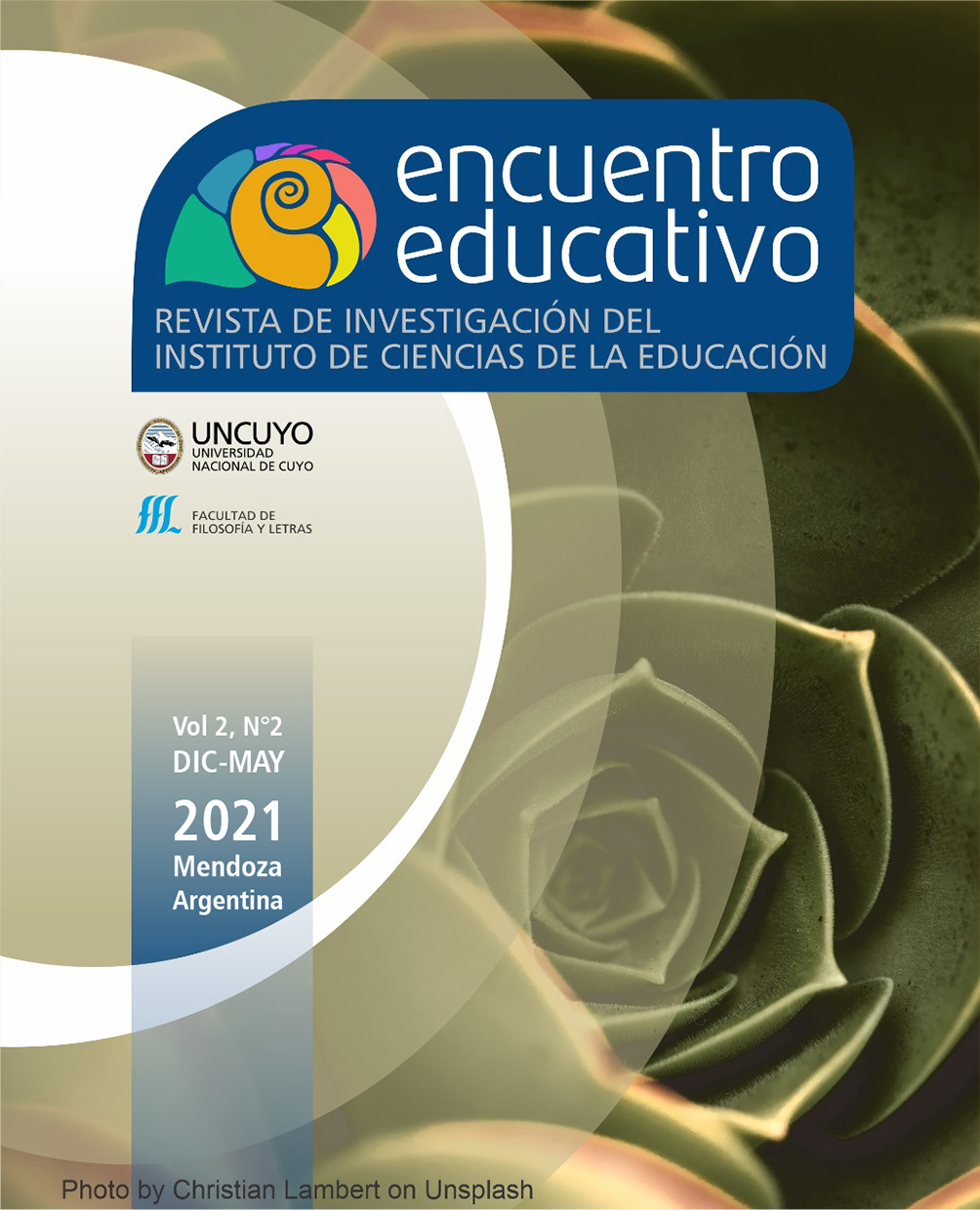The configuration of our teaching work in pandemic times.
An experience of Participatory Action Research in the Province of Misiones
Keywords:
Participatory Action Research, Teachers' work, Awareness, Working conditions, ASPOAbstract
The experience we share is part of the Research Project: Misiones: Educational Research and Networking. Action, Reflection, Action, at the FCEQyN, UNaM. This
Project leads to participative experiences construction and democratic and horizontal bonds among the educational agents involved. Therefore, the Participatory Action Research strategy of knowledge production was adopted
consequently revising our own activity as educators in context. Through a critical pedagogical approach, progress was made in the 'process of enlightenment' or 'self-training' (Carr and Kemmis, 1988) of the educators involved.
As a work team, in March 2020 we found ourselves in a context of Preventive and Compulsory Social Isolation (ASPO, Spanish Acronym), which led us to rethink our
practices as researchers. So, we asked ourselves: How did we do Action Research under these circumstances? How did we conform ourselves as a research group? How did we build pedagogical knowledge in a virtual context? What constituted our work as educators at that moment of history?
In this process, we constructed PAR alternatives as we considered important to support ourselves as a research group, virtually. Consequently, we developed several strategies that implied: instances of questioning, analysis, reflection, writing, reading, systematization of situations and experiences about our teaching work. This method contributed to the development of a space of reflection and
analysis, research in and from our own practice in the context of ASPO.
Our aim is to communicate the hints of self-reflection that enhance collaborative processes. We have built social empowerment, which is not only limited to the
fight for better salary conditions but also the construction of other ways of thinking about action research possible. We believe that this can be a significant contribution to think about PAR in relation to the use of technologies and the new age we are facing as researchers and educators.
References
Alliaud, A. (2017). Los artesanos de la enseñanza. Acerca de la formación de maestros con oficio. Paidós, 1° Edición.
Apple, M. (2000). Teoría crítica y educación. Miño y Dávila.
Carr W. y Kemmis S. (1988). Teoría crítica de la enseñanza. Martínez Roca.
Celman, S. (1998). La evaluación democrática. Remando contra la corriente. Revista Voces, VIII (5), 15-32.
Contreras Domingo, J. y Pérez de Lara Ferré, N. (2010). Investigar la experiencia educativa. Morata.
Clandinin, D. J. y Connelly, F. M. (2008). Relatos de Experiencias e Investigación Narrativa. En J.Larrosa, R.
Arnaus, V. Ferrer y N. Pérez de Lara (Ed.) Déjame que te cuente. Ensayos Sobre Narrativa y Educación (11-59). Laertes, 1a Edición.
Díaz Barriga, A. (2006). El enfoque de competencias en la educación. ¿Una alternativa o un disfraz de cambio? . Perfiles Educativos, tercera época, XXVIII, (11), 7-36.
Freire, P. (1970). Pedagogía del oprimido. Siglo XXI, Primera Edición.
Frigerio G. (2018, 1 de marzo) (Entrevista a Graciela Frigerio). Según Graciela Frigerio, antes que hacer énfasis en contenidos y saberes, la educación debería priorizar la relación de los sujetos con ambos.
Kemmis, S. (1999). La investigación-acción y la política de la reflexión. En A. Pérez Gómez, J. Barquín Ruiz
y F. Angulo Rasco (Ed.). Desarrollo profesional del docente. Política, investigación y práctica (95-118). Akal.
Litwin, E. (2008) El oficio de enseñar. Condiciones y contextos. Paidós.
Morin, E. (1984). Ciencia con conciencia. Anthropos.
Sirvent M. T. y Rigal L. (2012). Investigación Acción Participativa. Proyecto Páramo Andino.
Skliar, C. y Larrosa, J. (2009). Experiencia y alteridad en educación. Homo Sapiens.
Wenger, E. (2015). Comunidades de práctica. Aprendizaje, significado e identidad. Paidós.
Zoppi, A. M. (1998). La construcción de la profesionalidad docente. Investigación: Procesos de Producción de Innovaciones Curriculares PROINC. Universidad Nacional de Jujuy.
Zoppi, A. M. (1984). Curriculum y profesionalidad docente. Material inédito. www.anamariazoppi.com.ar.













